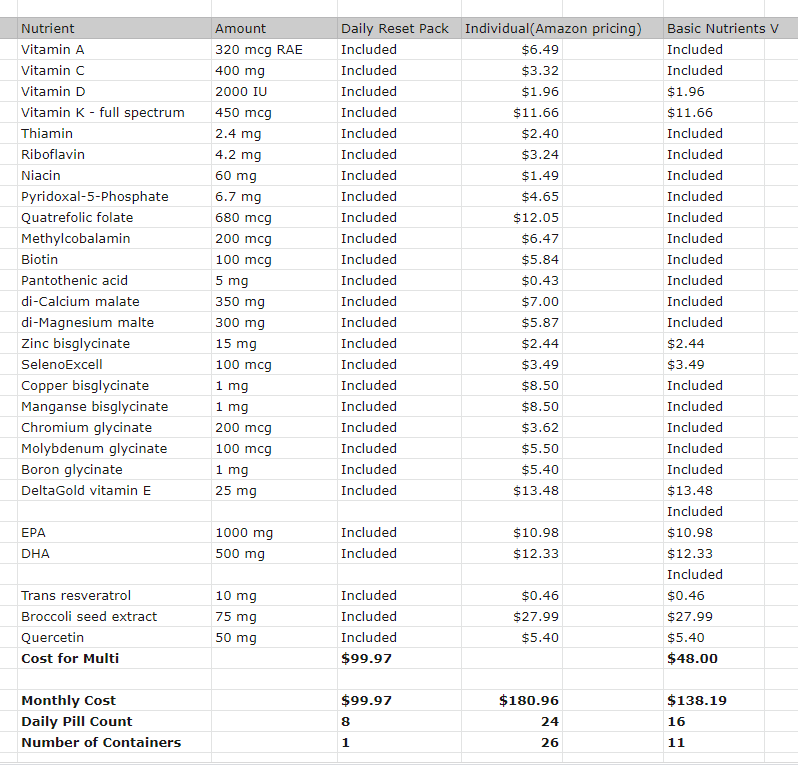After doing the research to help get you an answer, I have 21 nutrients I want to share with you that can help with optimal thyroid function.
I know, 21 might seem like a lot, but it’s important we have a thorough understanding of each. Today, I’ll break them all down for you…
Do You Need Supplements At All?
Here’s a great question: If you are on a healthy diet, do you need supplements in the first place?
The fact is that a healthy diet is essential because pills can never replace real food. Yet, in the data below, I’m going to show you specific benefits to supplemental nutrients.
Below, I’ll get into the role that nutrients play in normal thyroid function, as well as the benefits of supplementation with certain nutrients. These are points that are often confused.
It is key that you enjoy a healthy diet with enough nutrients to prevent a deficiency. At the same time, though, supplementing with nutrients can reveal additional benefits beyond just the diet.
Key Insight: Certain key nutrients can have a pharmacological effect on us, which can help, in ways that we can’t through diet alone.
- Stable thyroid levels
- Easier thyroid regulation
- Improved thyroid function
- Increased energy
- Better hair and skin
- Improvement in your mood
- Better control over memory
Key Insight: That’s because these nutrients work collectively! You want a global improvement in all things relating to your thyroid, so all 21 work better together, as the complete package.
A Deep Dive On Nutrient Testing
For nearly all of the 21 nutrients we’re going to talk about today, there are unfortunately no tests that predict whether or not that nutrient may improve your thyroid function.
In addition, for most, there aren’t even any accurate tests that determine whether or not you are deficient in that nutrient in the first place.
While tests do exist that measure the levels of most nutrients, unfortunately, many of them just are not accurate.
In truth, the concept of nutrient testing has failed to live up to its expectations. It’s not easy to do in real-time, and it’s not predictive in terms of who might benefit.
- Iron
- Vitamin D
- Trace minerals (possibly)
By and large, as appealing as it might sound it’s not really worthwhile. I have seen so many tests that try to do this, but they most often are not worth the effort.
Who Should Test Their Nutrients?
Absolutely anyone can benefit from testing their vitamin D levels. In ng/ml, the ideal vitamin D levels for adults with thyroid disease are 30-50.
Some might recommend higher levels, but this is often based on studies that reference different units that are 2.5 times higher. (Read More: A Full Breakdown On Vitamin D)
Those who are dealing with unexplained fatigue and hair loss might also do well to take a B12, folate, and iron levels test. (Read More: Testing For Your Iron Levels)
Folate and B12 can be tested with serum (blood) tests, and it is possible to be low in these nutrients before your blood levels even get below range.
If your levels are well above mid-range, you are not likely deficient. The same applies for a variety of B vitamins, too.
We also need to think about some minerals. This might include:
- Magnesium
- Calcium
- Selenium
In some cases, using red blood cell tests, you may be able to figure out if you are lacking in any of these important minerals.
The last one worth mentioning is checking for serum levels of zinc in the body. It’s not the most perfect indicator, but it can show up if someone has unusual losses.
The Top 21 Nutrients To Help Your Thyroid

These are the 21 things that are important and documented to be relevant for thyroid function. Let me take you through each of them, as well as the data behind them…
1. Vitamin A
In terms of its importance to thyroid function, vitamin A is known to be essential for the regulation of genes that control how the body responds to your TSH.
A large subset of those with thyroid disease may be unable to convert dietary carotenoids into active forms of vitamin A (like retinoic acid).
Vitamin A: The Evidence
In one recent study, 84 women between the ages of 17-50 were randomized to receive vitamin A supplements or a placebo.1
They were divided into three groups:
- OA – Overweight women given vitamin A
- OP – Overweight women given a placebo
- N – Non-overweight women given vitamin A
Over a period of four months, those receiving vitamin A supplements had a statistically significant improvement in their thyroid function.
In fact, their TSH scores lowered by roughly one full point, while their T3 levels elevated (roughly) by one full point, as well.
The chart below illustrates those results:

Vitamin A: How Should You Supplement It?
The best form of vitamin A in supplements is a combination of mixed carotenoids and palmitate.
Key Insight: The most useful amount, in coordination with a healthy diet, is 300 – 350 retinoic acid equivalent units — or, roughly 30% of the recommended daily value.
Keep in mind, though, that because vitamin A is fat-soluble, higher doses should definitely be avoided.
2. Vitamin C
We consider vitamin C important because of its ability to prevent damage to the thyroid cells from autoimmune disease.
It is also helpful because it aids selenium in its role of regulating iodine and thyroid hormones.2
Vitamin C: The Evidence
Many of those who take thyroid medications do not end up with consistent absorption of the active ingredients.
This problem ultimately leads to unresolved symptoms, such as fatigue or weight gain. It can also cause blood levels to be erratic.
In one recent study, 31 patients were selected who were on treatment for hypothyroidism but were unable to achieve stable blood levels.
After receiving low-dose vitamin C supplementation, their TSH levels improved by 69.2%, and serum T3 and T4 significantly improved, too.
Researchers concluded that:
“In patients with hypothyroidism and gastrointestinal pathology, vitamin C improves the abnormalities in serum-free T4, T3, and TSH concentrations. This approach is helpful in the management of these patients.”3
Vitamin C: How Should You Supplement It?
The truth is that vitamin C is safe across a wide range of dosages.
However, higher doses of any individual antioxidant can run the risk of lowering the activity of the antioxidant our bodies make internally (including glutathione and NRF2).
Key Insight: The best-studied form of vitamin C, with thyroid disease, is ascorbic acid. The ideal daily amount is 400 – 500 mg for adults with thyroid disease.
3. Vitamin D
Deficiencies in vitamin D are, unfortunately, all too common. Those who have them are also at a higher risk for developing:
Hashimoto’s Thyroiditis
Graves’ Disease
Thyroid Cancer4
Vitamin D: The Evidence
The evidence behind vitamin D is that supplementation of it may lower blood levels of thyroid antibodies, particularly of anti-thyroid peroxidase (TPO).5,6
It has also been shown to improve TSH levels by an average of 0.4 points.7
Vitamin D: How Should You Supplement It?
The ideal blood levels of vitamin D, for those with thyroid disease or general autoimmunity, are 30 – 50 ng/mL (Read More: All About Vitamin D).8
Key Insight: That means that the best starting dose of vitamin D for adults with thyroid disease is 2000 IU daily, although some may need more to reach the desired blood levels.
4. Vitamin E

When thyroid follicles convert iodide to iodine, iodine has the potential to cause free radical damage to thyroid cells (even though it is necessary to create thyroid hormone).
The benefit of vitamin E is that it works in conjunction with selenium, in order to protect the thyroid cells against damage.9
Vitamin E: The Evidence
One of the most interesting studied benefits of vitamin E is associated with memory. Memory loss, from thyroid disease, appears to relate to free radical stress within the brain.
Vitamin E is a fat-soluble antioxidant that can lower free radical stress. In animal studies, supplementation of it has been shown to improve cognitive function in hypothyroidism.10
Vitamin E: How Should You Supplement It?
In food, vitamin E is found in a wide variety of tocopherols and tocotrienols. Synthetic vitamin E, on the other hand, is alpha tocopherol only.
The best version of vitamin E, in its supplemental form, is isomers that include delta and gamma tocotrienols.
Key Insight: An ideal dose for adults with thyroid disease is 25 mg or 167% of the recommended daily value.
5. Vitamin K
We know that vitamin K is essential for healthy blood coagulation and bone metabolism.
In fact, abnormal thyroid hormone levels can increase the amounts of vitamin K needed for normal blood clotting.11
Vitamin K: The Evidence
Those with thyroid disease often have a greater risk of peripheral vascular disease, examples of which include:
- Stroke
- Aneurysms
- Blood Clots
Vitamin K supplementation works in that it has been shown to lower vascular stiffness greater than a placebo.12
At the same time, people with abnormal thyroid hormone levels have a higher risk of bone thinning and hip fractures.
For this reason, larger studies would be helpful, but the initial research suggests that both dietary and supplemental vitamin K appear to help lower the risk of bone loss and improve bone repair in the body.13
Vitamin K: How Should You Supplement It?
Dietary vitamin K is otherwise called menaquinone, and it comes in a wide variety of subtypes.
Synthesized vitamin K1 is called phytonadione. Since studies show the benefits of both dietary and supplemental vitamin D, ideal supplementation would include a variety of dietary menaquinone compounds (in addition to vitamin K1).
Key Insight: An ideal dose for adults with thyroid disease is 25 mg or 167% of the recommended daily value.
6. Thiamine

Thiamine is a B vitamin that enables your body to produce energy from dietary carbohydrates.
In addition, it has been speculated that thiamine may play a role in fatigue secondary to thyroid disease. We only store thiamine in small quantities, so we need to ingest it regularly.14
Thiamine: The Evidence
In one recent study, thiamine was shown to resolve the fatigue secondary to Hashimoto’s thyroiditis. The results also showed up quickly — in a matter of hours or days!
The initial findings are encouraging and a larger follow-up study with a placebo group would certainly be more helpful.15
Thiamine: How Much Should You Supplement It?
Megadoses of thiamine is not recommended, as it may interfere with the cofactors needed for optimal mitochondrial function. For that reason, it should be avoided.
That said, the version of thiamine supplementation that is best documented for reversing thiamine deficiencies is thiamine hydrochloride (HCL).
Key Insight: The ideal daily dose for people with thyroid disease is 2.4 mg or 200% of the daily value.
7. Riboflavin
There have been studies showing that the symptoms of riboflavin deficiency closely mimic those of hypothyroidism.16
In addition to that, it has also been shown that abnormal thyroid levels can negatively impact riboflavin absorption.17
Riboflavin: How Much Should You Supplement It?
The preferred type of riboflavin in supplementation is known as riboflavin-5-phosphate. This is otherwise known as the active form of riboflavin.
Thyroid hormones are essential for the activation of riboflavin, and those with thyroid disease may not be able to convert it at all.18
Key Insight: The best amount of riboflavin for adults with thyroid disease is roughly 4 mg or 300% of the daily value.
8. Niacin
Like other B vitamins, niacin is essential thanks to its ability to produce energy from the breakdown of carbohydrates and fats.
Specifically, concerning those with thyroid disease, they may have a more difficult time generating energy from food because too much of it is stored as fat within the liver.
Niacin: The Evidence
The supplementation of niacin has been shown to help people with thyroid disease, by lowering the inactivating protein thyroid-binding globulin.
When this protein is lowered, thyroid hormones become more available for use by the cells.19
Niacin: How Much Should You Supplement It?
Delayed-release, slow-release, or time-released niacin supplements should be avoided, since they may slow thyroid function.20
Key Insight: The best dose of niacin for adults, with thyroid disease, is roughly 60 mg or 375% of the recommended daily value.
Higher doses, those over 200 mg daily, can cause symptoms of niacin flushing and risks for visual damage due to niacin maculopathy.21
9. Vitamin B6

Studies have revealed that those with thyroid disease are prone to be low in many essential nutrients, including vitamin B6.22
Thyroid hormones undergo numerous steps of conversion after they are produced. Some of this conversion is performed by the enzyme thyroid-hormone transaminase.
This enzyme is dependent on activated B6 (otherwise known as pyridoxal-5-phosphate).23
Vitamin B6: The Evidence
Iron deficiency anemias are often common with thyroid disease. Yet, many people do not improve from iron supplementation.
That in mind, additional supplementation with B6 may help improve anemias that do not respond well to oral iron therapy.24
Vitamin B6: How Much Should You Supplement It?
Dietary sources and common supplements supply B6 in the form of pyridoxine.
The liver then converts pyridoxine to pyridoxal-5-phosphate (PSP). When people have higher levels of inflammation, they are often low in PSP (despite having an abundance of B6)25
Key Insight: For this reason, PSP is the preferred form of B6 for those with chronic thyroid disease.
In addition, PSP is also safer than B6 across a wide range of doses. The ideal amount of PSP for adults with thyroid disease is roughly 6 mcg (or 400% of the recommended daily value).
10. Folate
Those with genetic variations of the MTHFR gene may be unable to safely utilize folic acid, the synthetic form of folate.
MTHFR gene variations are nearly universal in those with significant thyroid disease.26
Synthetic folic acid has been shown in animal models to directly suppress the production of T4 and T3.27 It may also be a risk factor for the development of colorectal cancer.28
Folate: The Evidence
Thyroid hormones regulate a group of chemical reactions called methylation. These reactions are important for things like:
- Energy levels
- Mood
- Weight Loss
- Detoxification
Folate supplementation has been shown to improve methylation in those taking thyroid medication.29
Folate: How Much Should You Supplement It?
In short, natural folate is definitely preferred over synthetic folic acid.
Quatrefolic is the version of folate that requires no conversion to be used as 5-methyl folate. Even those with multiple gene variations can utilize it.
Key Insight: The best dosage for adults with thyroid disease is 600 – 700 mcg or 170% of the recommended daily value.
11. Vitamin B12
As many as 40% of people with thyroid disease are deficient in B12.
Symptoms of low B12 in those with thyroid disease include:
- Weakness
- Impaired memory
- Depression30
B12: The Evidence
In one study, when B12 was given to those with low B12 and deficiency symptoms, the majority saw their symptoms improve in as short as several months.
Some saw similar symptoms improve even though their B12 levels were not low to begin with.31
B12: How Much Should You Supplement It?
The most current version of bioavailable B12 is called methylcobalamin. New research has even shown that now oral B12 can be just as effective as injectable B12.32
Key Insight: The best amount of methylcobalamin for adults with thyroid disease is 200 mcg daily, or 8333% of the recommended daily allowance.
12. Biotin
One of the most troubling symptoms of thyroid disease is hair loss. Many find that it does not improve with thyroid medication.
It’s been found that up to 38% of women with hair loss may be low in biotin.33
Biotin: The Evidence
High-dose biotin supplementation consistently reverses biotin deficiency and related symptoms. It is also absorbed well orally and is completely safe.
Biotin: How Much Should You Supplement It?
It is important to first stop taking any vitamins that contain biotin within three days prior to having your thyroid blood tests drawn.34
When it comes down to it, biotin is best absorbed in the form of d-biotin. The ideal daily dose for adults with thyroid disease is 100 mcg per day or 333% of the recommended daily value.
Higher doses do not give greater benefit but may skew additional tests besides thyroid tests. This is true even when biotin supplements are avoided prior to testing.35
13. Calcium
Here’s something I really want you to know: calcium is crucial for those with thyroid disease.
That’s because abnormal thyroid levels can lead to bone thinning and hip fractures.36 In addition, many with thyroid disease avoid dairy products due to the excess iodine content (or digestive issues).
Calcium: The Evidence
With diets low in dairy products, the recommended intake of calcium may be impractical without supplementation. Calcium supplements can even reduce the risk of hip fracture when used on a long-term basis.37
Calcium: How Much Should You Supplement It?
It is important to know that calcium supplementation can cause poor absorption of thyroid medication. Insoluble versions, like calcium carbonate, oyster shell calcium, and bone-derived calcium can impair the absorption of thyroid medications (even when separated by 10 hours).
Key Insight: Plant-derived calcium, such as dicalcium malate can safely be taken one hour after thyroid medication.
Since dicalcium malate is better absorbed, less is needed, 300 mg per day is an effective dose for adults with thyroid disease.
14. Magnesium
For healthy immune function and thyroid hormone metabolism, magnesium is essential (Read More: Magnesium to Boost Your Energy Levels).
Studies have shown that low levels of magnesium increase the risk of elevated antibodies against thyroglobulin and thyroid peroxidase and cause low thyroid function.38
Magnesium: The Evidence
In a small clinical trial, magnesium supplementation, along with selenium, was shown to improve thyroid function and ultrasonographic dings in a group of women with long-standing thyroid disease.39
Magnesium: How Much Should You Supplement It?
Magnesium can act as a powerful osmotic laxative.
This effect is a function of the type and the dosage of magnesium used, and it is responsible for many gastrointestinal side effects.
Dimagnesium malate is a well-absorbed type of magnesium that can be used in lower doses. A total intake of 300 mg per day, or 70% of the recommended daily value, is best for adults with thyroid disease.
15. Zinc
Zinc is essential for the production of thyroid hormones, as well as:
- Their absorption and use by the cells
- The conversion of T4 into T340
The relationship between zinc and thyroid disease even runs both ways. Low amounts of zinc can impair thyroid function, and impaired thyroid function can lead to zinc deficiencies.41
Zinc: The Evidence
Supplementing with zinc alone, or zinc with selenium, had pronounced effects on thyroid function in overweight women with hypothyroidism.
This study was a double-blind, placebo-controlled one. It also showed that zinc significantly improved both free T3 and free T4 levels (even though blood levels didn’t change).42
Zinc: How Much Should You Supplement It?
Key Insight: The best supplementation of zinc is in the form of zinc bis-glycinate chelate, which should come in the form of 15 mg or 136% of the recommended daily value.
16. Selenium
Next to iodine, selenium has more effect on thyroid function than any single nutrient.
In fact, it is necessary for every stage of thyroid function, which includes:
- Iodine absorption
- Iodine activation
- Hormone formation
- Hormone release
- Iodine uptake by the thyroid
- TSH production
- Cell membrane receptor response
- Thyroid hormone conversion
Selenium: The Evidence
The supplementation of selenium has been shown to improve thyroid hormone levels and lower thyroid antibodies (regardless of a participant’s selenium levels).44
For thyroglobulin antibodies, it may take 12 months to see a clear decrease, whereas three months may be adequate to see a decrease in thyroid peroxidase antibodies.45
Selenium: How Much Should You Supplement It?
The preferred form of selenium is a combination called SelenoExcell. It is the one form that has a spectrum of selenium chelations found in foods (including selenocysteine).
Key Insight: These forms are more easily regulated by the body, which is why the suggested amount is 100 mcg or 182% of the recommended daily value.46
17. Copper

Copper is a known cofactor in the enzyme superoxide dismutase, which is essential for thyroid function.
In a study of over 1300 Americans, serum copper levels have been shown to be related to both fT3 and fT4.47
Copper: The Evidence
There are no studies available on copper supplementation for thyroid disease.
That said, copper supplementation is well absorbed, and it is also effective at reversing the effects of copper deficiency.48
Copper: How Much Should You Supplement It?
The best absorbed forms of copper are the mineral chelates, such as copper bisglycinate chelate.
Key Insight: The ideal dose of copper for adults with thyroid disease is 1mg or 111% of the recommended daily value.
18. Manganese
Manganese is an essential cofactor in the enzyme 5’ deiodinase type 1 which is involved in activating thyroid hormones.
Daily ingestion of manganese over 10 mg from industrial may have negative effects on thyroid function.49
Manganese: The Evidence
There are no studies showing the effects of manganese supplementation on those with thyroid disease.
Manganese: How Much Should You Supplement It?
The best absorbed forms of manganese are the mineral chelates, such as manganese bisglycinate chelate.
19. Chromium
Those with autoimmune thyroid disease are often low in a large number of nutrients, including chromium.50
Chromium has been shown to be essential for blood sugar regulation. In addition to that, many with thyroid disease have blood sugar abnormalities including diabetes, prediabetes, or hypoglycemia.51
Chromium: The Evidence
Chromium supplementation has been shown to improve type 2 diabetes and the complications of metabolic syndrome.52
Chromium: How Much Should You Supplement It?
There are several types of chromium that have been shown to be safe and effective in supplementation. One of the best documented forms is chromium nicotinate glycinate chelate.
Key Insight: The best amount for adults with thyroid disease is 200 mcg or 571% of the recommended daily value.
20. Molybdenum
In the large National Health and Nutrition Examination Survey of American adults, the risk for thyroid disease was correlated with lower levels of molybdenum.53
Other work in this subject has shown that molybdenum status has significant associations with fT4, fT3, and total T3 levels.54
Molybdenum: The Evidence
Molybdenum is well absorbed from supplementation. In fact, roughly 88 – 93% of oral doses enter the bloodstream.55
Molybdenum: How Much Should You Supplement It?
The best-standardized form of molybdenum is Molybdenum Glycinate Chelate.
Key Insight: Adults with thyroid disease are advised to take 100 mcg daily or 222% of the recommended daily value.
21. Omega-3 Fats (EPA and DHA)
A study compared dietary habits between 462 adults with thyroid disease against 1388 similar adults free of thyroid disease.
In it, it was found that one of the strongest predictors of autoimmune thyroid disease was a lower intake of omega 3 fatty acids.56
Omega-3 Fats: The Evidence
Fish oil supplements have been shown to lower pain and inflammation in those with autoimmune disease.
When used at recommended dosages, fish oil supplements are well-tolerated and have no typical side effects.57
Omega-3 Fats: How Much Should You Supplement It?
It is important to be sure that fish oil supplements have under 10 mcg of iodine per serving. That’s because many can be concentrated in high-iodine fish sources.
Key Insight: For adults with thyroid disease, the ideal dose of omega-3 fats is 1000 mg of EPA and 500 mg of DHA.
Bonus: Deiodinase Support
Thyroid hormones are carefully regulated by a group of enzymes called deiodinases.
These enzymes help convert T4 into T3, and T3 into T2. If they do not work well, too much reverse T3 can form. They are also important for the final steps of eliminating thyroid hormones.
Many of the essential vitamins and minerals help thyroid function by helping the body form deiodinase enzymes. There are three main deiodinase enzymes called:
- D1
- D2
- D3
First, your body must get enough T4 and T3 to work with. This can come from your thyroid or from thyroid medication.
Once the hormones are available, it is up to the deiodinase enzymes to assure you have the right amount of each hormone inside the cells and inside the bloodstream.
The following table illustrates the differences between them58
| Enzyme | D1 | D2 | D3 |
| Location | Liver, kidney, thyroid | Brain, pituitary gland, skeletal muscle | Brain, placenta, fetal tissues |
| Action | Converts T4 into T3 and rT3. Converts T3 and rT3 into T2 | Converts T4 into T3. converts rT3 into T2 | Converts T4 into rT3. Converts T3 into T2 |
| Blocked by | Fasting, chronic illness | T3, cold exposure, overfeeding | Cortisol, growth hormone |
| Active in | Hyperthryoid patients | unknown | Pregnancy |
In blood tests, TSH scores show whether or not the body has enough thyroid hormone to work with. High TSH means too little thyroid hormone, and a low score means too much.
Roughly 0.5 – 1.9 IU/mL is a healthy range. There are some situations such as age, previous thyroid cancer, heart disease, or pregnancy that can change this goal.
When the TSH is at a good range and the hormone levels (T4, T3, or reverse T3) are not at a good range, the issue is usually the functioning of the deiodinase enzymes.
These enzymes depend on a variety of above-mentioned essential micronutrients for proper function. These include:
- Selenium
- Zinc
- Copper
- Pyridoxal 5 phosphate
- Folate
Non-essential nutrients have also been shown to play a role in deiodinase enzymes. They include:
- Trans-Resveratrol – Not only has it been shown to improve deiodinase function, but also helping thyroid cells respond better to TSH and helping it absorb enough iodine (but not too much).59 A useful dose for adults with thyroid disease is 10 mg daily.
- Broccoli Sprout Extract – This helps deiodinase enzymes, and also improves the thyroid cells’ response to TSH (and may lower thyroid antibodies).60 A useful dose for adults with thyroid disease is 75 mg daily (with food).
- Quercetin – This one regulates the D1 enzyme, and it also helps the thyroid better resist the harmful effects of excess iodine. A useful dose of quercetin for adults with thyroid disease is 50 mg daily with food.
Non-Nutritive Supplements
It also helps to consider other supplements that are not essential vitamins or minerals. That’s because these have been purported to be useful for thyroid function, and can include:
| Supplement category | Example |
| Animal extracts | Bone broth |
| Herbal medicines | Coleus forskohlii, Ashwagandha (withania somnifera) |
| Sea vegetables | Kelp (Laminaria spp.) |
| Essential oils | Frankincense, lavender |
| Probiotics | Bacillus subtilis, soil based organisms |
| Non essential amino acids | Tyrosine, Taurine |
| Fungi | Reishi, shiitake |
| Inorganic mineral blends | Shilajit, colloidal minerals |
Does Your Multivitamin Need To Be Fermented?
The simple answer is no, it does not.
The fact is that fermentation changes complex molecules in ways that might make them more useful, but if it did have any effect on simple molecules (like vitamins) they would be less active.
Action Steps: Multivitamins
So, should you take multivitamins? It’s a good idea for the following reasons:
The general beneficial health effects
The cost-effectiveness of only needing to invest in one type
A lower pill count to make the process simpler

In fact, one study worth mentioning suggests that multivitamins can be safe for long-term use of over ten years. That’s important because it means over time you are safe to use them!61
Too Much Of A Good Thing?
It is common to think that if a nutrient helps with something, then higher amounts of the nutrient must be more helpful.
Key Insight: In the case of thyroid function, this is often not the case. All nutrients have levels above which they become counterproductive.
It is often the case that the very thing a nutrient helps with at the right dose, it can block at an excessive dose. The balance is delicate, and you need to be mindful of it.
Most people with thyroid disease are missing some vital nutrients while taking others in doses that are counterproductive.
The following is a summary table that shows which nutrients are helpful, which forms and doses are best, and how much is excessive. [/vc_column_text][/vc_column][/vc_row][vc_row][vc_column][vc_column_text]
| Nutrient | Preferred form | Amount | Excessive Amount |
| Fat Soluble Vitamins | |||
| Vitamin A | Mixed carotenoids and palmitate | 320 mcg RAE | Over 1000 IU Daily |
| Vitamin C | Ascorbic acid | 400 mg | Over 1000 mg daily |
| Vitamin D | D3 Cholecalciferol | 2000 IU | Per blood levels |
| Vitamin E | Vitamin E isomers, DeltaGold delta and gamma tocotrienols | 25 mg | Over 300 IU daily |
| Vitamin K | K1, K2 and Full Spectrum MK6, 7, 9 | 450 mcg | Over 600 mcg daily |
| Water Soluble Vitamins | |||
| Vitamin B1 – Thiamin | Thiamine HCL and Bentofamine | 2.4 mg | Over 25 mg daily |
| Vitamin B2 – Riboflavin | Riboflavin-5-Phosphate | 4.2 mg | Over 25 mg daily |
| Vitamin B3 – Niacin | Niacinamide and Niacin | 60 mg | Over 100 mg daily |
| Vitamin B5 – Pantothenic acid | Calcium Pantothenate | 5 mg | Over 25 mg daily |
| Vitamin B6 | Pyridoxal-5-Phosphate | 6.7 mg | Over 25 mg daily |
| Vitamin B7 – Biotin | d-Biotin | 100 mcg | Over 300 mcg daily |
| Vitamin B9 – Folate | Quatrefolic folate 5-methyltetrahydrofolate | 680 mcg | Over 1000 mg daily |
| Vitamin B12 | Methylcobalamin | 200 mcg | Over 500 mcg daily |
| Minerals | |||
| Calcium | di-Calcium malate | 350 mg | Over 500 mg daily |
| Magnesium | di-Magnesium malate | 300 mg | Over 500 mg daily |
| Zinc | Zinc bisglycinate | 15 mg | Over 30 mg daily |
| Selenium | SelenoExcell natural selenium | 100 mcg | Over 300 mcg daily |
| Copper | Copper bisglycinate | 1 mg | Over 2 mg daily |
| Manganese | Manganese bisglycinate | 1 mg | Over 5 mg daily |
| Chromium | Chromium Nicotinate Glycinate | 200 mcg | Over 400 mcg daily |
| Molybdenum | Molybdenum glycinate | 100 mcg | Over 500 mcg daily |
| Boron | Boron glycinate | 1 mg | Over 3 mg daily |
| Essential Fatty Acids | |||
| EPA | Eicosapentaenoic Acid | 1000 | Over 2000 mg daily |
| DHA | Docosahexaenoic Acid | 500 | Over 1000 mg daily |
| Deiodinase Support | |||
| Resveratrol | Trans Resveratrol | 10 mg | |
| Broccoli seed extract | 75 mg | ||
| Quercetin | 50 mg |
Bottom Line: The goal in supplementing to improve thyroid function is to get enough of each of the recommended nutrients without going over the excessive amounts.
The Logistics of Multivitamins
There are, of course, several practical considerations that come up, which include:
- Ongoing costs
- Pill count
- Convenience
The good news is that the Daily Reset Pack is formulated with all of this in mind. It is 1 packet, taken twice daily with food. What follows is a cost breakdown to showcase just how much it can help save you, too:


Why Traditional Multivitamins Can Be A Problem
There are some important things to keep in mind when it comes to multivitamins.
I developed the Daily Reset Pack to be mindful of all these things, but typical multivitamins for those with thyroid disease may encounter the following issues:
- Iodine (Read More: All About Iodine)
- Folic Acid
- Too much vitamin A (leading to birth defects or cancer risk)
- Minerals that won’t absorb
- Insoluble calcium
- Iron
- Excessive water-soluble vitamins that can damage the liver
The thing to remember is that you should be supplementing with the top 21 each and every day.
But another important consideration is your diet. After all, you need to eat well either way, but supplementation can be both helpful and important.
These supplements are not to make up for nutritional deficiencies, but to build on amounts you’re getting to ensure your thyroid performs its best.
Key Insight: That said, they have been shown to help thyroid function whether or not you are deficient, so these are still helpful even when you’re on a good diet.

Discover More About Your Thyroid Today
Have you been thinking about your thyroid and its role in your overall health? The best place to begin is by taking the Thyroid Quiz (Click Here: Take The Quiz Today).
It can help unlock valuable information about your thyroid, and action steps you can take today to ensure its long-term health and performance.
Resources
2 – https://www.ncbi.nlm.nih.gov/pmc/articles/PMC2266752/
3 – https://academic.oup.com/jcem/article/99/6/E1031/2537305
4 – https://www.ncbi.nlm.nih.gov/pmc/articles/PMC5618598/#:~:text=Low%20levels%20of%20vitamin%20D,4%2C5%2C6%5D
5 – https://www.ncbi.nlm.nih.gov/pmc/articles/PMC5618598/
6 – https://sci-hub.tw/https://doi.org/10.1055/s-0042-123038
7 – https://www.ncbi.nlm.nih.gov/pmc/articles/PMC6166548/
8 – https://www.health.harvard.edu/blog/at-harvard-forum-experts-debate-how-much-vitamin-d-is-enough-201103292158
9 – https://pubmed.ncbi.nlm.nih.gov/23255045/?from_term=vitamin+e+thyroid&from_filter=species.humans&from_pos=3
10 – https://pubmed.ncbi.nlm.nih.gov/23001627/
11 – https://pubmed.ncbi.nlm.nih.gov/21382270/
12 – https://pubmed.ncbi.nlm.nih.gov/30514729/?from_term=vitamin+k+supplementation&from_pos=5
13 – https://sci-hub.se/10.1016/j.metabol.2017.01.032
14 – https://ods.od.nih.gov/factsheets/Thiamin-HealthProfessional/
15 – https://pubmed.ncbi.nlm.nih.gov/24351023/
16 – https://academic.oup.com/endo/article-abstract/83/3/461/2695716?redirectedFrom=fulltext
17 – https://pediatrics.aappublications.org/content/50/6/896
18 – http://roughly
19 – https://pubmed.ncbi.nlm.nih.gov/7776715/
20 – https://pubmed.ncbi.nlm.nih.gov/1469935/?from_term=niacin+thyroid&from_pos=6
21 – https://www.ncbi.nlm.nih.gov/pmc/articles/PMC4458328/
22 – https://pubmed.ncbi.nlm.nih.gov/25614676/?from_term=b6+thyroid&from_pos=1
23 – https://pubmed.ncbi.nlm.nih.gov/4686924
24 – https://pubmed.ncbi.nlm.nih.gov/19920848/
25 – https://www.ncbi.nlm.nih.gov/pmc/articles/PMC3374666/
26 – https://www.ncbi.nlm.nih.gov/pmc/articles/PMC3482366/
27 – https://onlinelibrary.wiley.com/doi/pdf/10.1111/j.1601-183X.2011.00749.x
28 – https://www.ncbi.nlm.nih.gov/pmc/articles/PMC1856406/
29 – https://www.ncbi.nlm.nih.gov/pmc/articles/PMC3861905/
30 – https://pubmed.ncbi.nlm.nih.gov/18655403/
31 – https://pubmed.ncbi.nlm.nih.gov/18655403/
32 – https://www.ncbi.nlm.nih.gov/pmc/articles/PMC3874775/
33 – https://www.ncbi.nlm.nih.gov/pmc/articles/PMC4989391/
34 – https://www.ncbi.nlm.nih.gov/pmc/articles/PMC6103391/
35 – https://pubmed.ncbi.nlm.nih.gov/28973622/?from_term=biotin+supplementation+hormone&from_filter=species.humans&from_pos=2
36 – https://www.ncbi.nlm.nih.gov/pmc/articles/PMC7151086/
37 – https://www.ncbi.nlm.nih.gov/pmc/articles/PMC6966160/
38 – https://www.ncbi.nlm.nih.gov/pmc/articles/PMC6028657/
39 – https://www.ncbi.nlm.nih.gov/pmc/articles/PMC4661508/
40 – https://pubmed.ncbi.nlm.nih.gov/30772815
41 – https://pubmed.ncbi.nlm.nih.gov/28530324/?from_term=zinc+thyroid&from_filter=species.humans&from_pos=1
42 – https://pubmed.ncbi.nlm.nih.gov/25758370/?from_term=zinc+supplementation+thyroid&from_filter=species.humans&from_pos=1
43 – https://pubmed.ncbi.nlm.nih.gov/26313901/?from_term=selenium+supplementation+thyroid&from_filter=species.humans&from_pos=3
44 – https://pubmed.ncbi.nlm.nih.gov/25740851/
45 – https://pubmed.ncbi.nlm.nih.gov/27702392/?from_term=selenium+supplementation+thyroid&from_filter=species.humans&from_pos=1
46 – https://www.news-medical.net/health/Selenium-Toxicity.aspx
47 – https://sci-hub.se/10.1007/s12011-014-9992-9
48 – https://pubmed.ncbi.nlm.nih.gov/21321490/?from_term=copper+supplementation&from_filter=species.humans&from_pos=9
49 – https://www.ncbi.nlm.nih.gov/pubmed/8971361/
50 – https://pubmed.ncbi.nlm.nih.gov/25614676/?from_term=chromium+thyroid&from_filter=species.humans&from_pos=1
51 – https://sci-hub.se/10.1007/bf02784602
52 – https://pubmed.ncbi.nlm.nih.gov/30855110/?from_term=chromium+supplementation+&from_filter=species.humans&from_pos=2
53 – https://www.tandfonline.com/doi/full/10.1080/09603123.2011.605877?scroll=top&needAccess=true
54 – https://sci-hub.se/10.1016/j.ijheh.2012.08.005
55 – https://www.ncbi.nlm.nih.gov/pubmed/7733035
56 – https://www.ncbi.nlm.nih.gov/pmc/articles/PMC5707658/
57 – https://pubmed.ncbi.nlm.nih.gov/26283657/
58 – https://www.ncbi.nlm.nih.gov/pmc/articles/PMC1578599/
59 – https://www.ncbi.nlm.nih.gov/pubmed/20151827
60 – https://sci-hub.se/10.1016/j.fct.2019.02.004
61 – https://www.ncbi.nlm.nih.gov/pubmed/28336109

1. Schedule a Thyroid Second Opinion with me, Dr. C, Click Here for Details
2. Download and use my Favorite Recipes Cookbook Here
3. Check out my podcast Medical Myths, Legends, and Fairytales Here
Dr. Alan Glen Christianson (Dr. C) is a Naturopathic Endocrinologist and the author of The NY Times bestselling Adrenal Reset Diet, The Metabolism Reset Diet and The Thyroid Reset Diet.
Dr. C’s gift for figuring out what really works has helped hundreds of thousands of people reverse thyroid disease, lose weight, diabetes, and regain energy. Learn more about the surprising story that started his quest.


